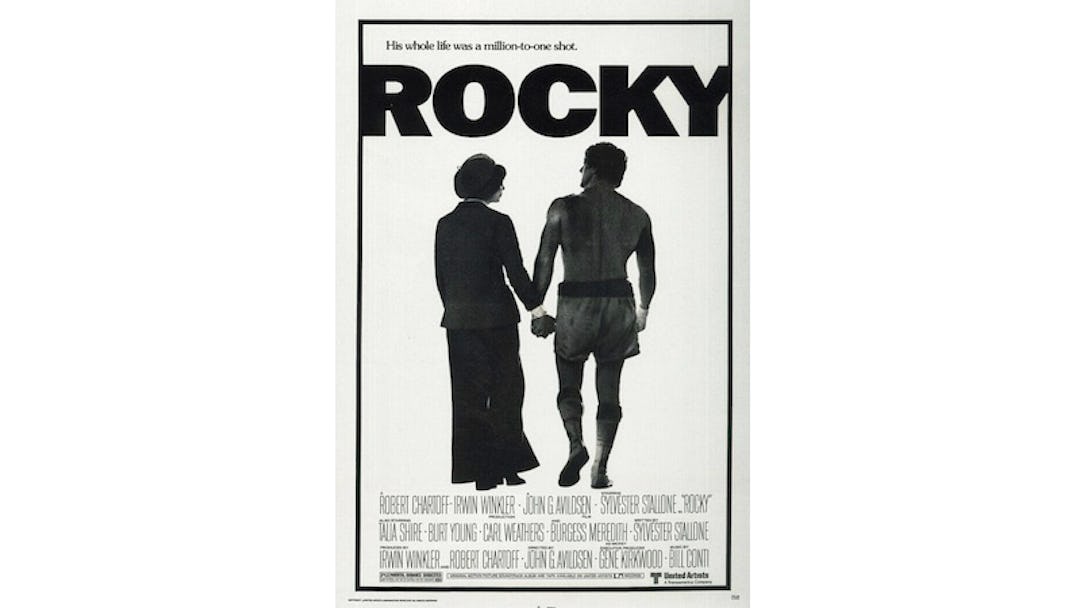Muhammad Ali’s life and character were so rich, so multi-faceted, that the widespread mourning which greeted news of his passing Saturday reverberated far beyond sports fans, to history buffs, civil rights activists, Muslims, politicians, you name it. Film circles were no exception; he was always one of our most cinematic athletes, thanks to his movie-star charisma, the surplus of great documentaries about him (including the Oscar-winning When We Were Kings), his flawed but fascinating 2001 Michael Mann biopic, and, of course, his implicit presence in the Rocky movies. And thus, one of the weekend’s hot reads was this extraordinary 1979 Roger Ebert essay, which details an evening in which the Champ decided to “play movie critic” by joining Ebert for a screening of that summer’s Rocky II.
He had reason to be curious. The antagonist of the first two Rocky pictures, Carl Weathers’s Apollo Creed, was clearly based on Ali – a cocky, self-satisfied showman, a talented fighter with a gift for gab (and rhymes). Ali knew the score; he told Ebert Rocky II stars “Apollo Creed as Muhammad Ali,” observed of the sequel, “Apollo sounds like me. Insulting the opponent in the press, to get him psyched out. That’s me exactly,” and noted, “Weathers told me he got the dancing and the jabbing, the whole style of Apollo Creed, from watching my movies.” And Stallone was never shy about admitting the champ’s influence.
Ebert reports Ali “really like[d] the original Rocky,” and praised the sequel as “A great movie” with “all the ingredients.” But he was also keenly aware of the subtext reverberating through these films. To wit:
Rocky’s wife turned to him and said, “There’s one thing I want you to do for me. Win.” “Yeah!” said Ali. “Beat that nigger’s ass!”
The Rocky movies are beloved, and often – though not always – rightfully so. But their (mostly white, mostly male) fans don’t much care to contemplate these what these films have to say about Ali in particular and race in general. Because while the Rocky films, particularly the initial, Creed-fighting outings, are on one level the story of a never-say-die underdog who makes his way based on sheer pluck and determination, there’s also an undertone of racial fantasy at play here, of an “authentic” white hope who knocks this cocky black contender down a notch or two.
It’s not even particularly subtle. In the first film’s strategy session, in which Creed and his team are forced by his challenger’s injury to reconfigure his big Bicentennial bout with only five weeks’ notice, Creed insists, “you better find me another white contender, and I mean in a flash,” and later underscores the need for “a Snow White underdog.” Such strategy sessions undoubtedly occurred in this era – but in the opposite direction, with “great white hopes” like Gerry Cooney, Jerry Quarry, and Willie de Wit propped up and promoted as possibilities to take back the title from the likes of Ali, Larry Holmes, and Joe Frazier. They didn’t, but a certain type of sports fan never stopped believing, and Stallone provided them with an alternate reality where, from 1976 to 1986, the title of heavyweight champion is – with the exception of the short period following his defeat by Clubber Lang – held by a white fighter. The real WBC was the exact opposite, with series of black title-holders interrupted briefly by a single white fighter, South African Gerrie Coetzee.
No one was more attuned to this element of Rocky’s storytelling, and its appeal, than Ali. Of the ending of Rocky II, when Rocky wins the title from Creed, he told Ebert, “For the black man to come out superior would be against America’s teachings. I have been so great in boxing they had to create an image like Rocky, a white image on the screen, to counteract my image in the ring. America has to have its white images, no matter where it gets them. Jesus, Wonder Woman, Tarzan and Rocky.”
The wave of warmth, good will, and admiration that followed Ali’s passing (from even the least likely of sources) makes it difficult for those of us who weren’t alive in Ali’s prime to grasp how thoroughly he was despised by a giant segment of the population. A few similar voices made themselves heard as the tributes rolled in; one in particular, a Tennessee assemblyman (and Dukes of Hazzard fan) drew heavy ire on social media for calling Ali “Cassius Clay” (which the champ dubbed his “slave name”) and deeming his “failure to enlist in the military when the call was made” a “black cloud on his character” (where to start – the “black cloud” dog whistle or the conflation of enlisting and being drafted?).
His tweets have since been deleted, but they’re valuable; in Ali’s time, such views weren’t just held by backwoods outliers. In Rocky, Apollo Creed says, “I’m sentimental. And a lot of other people in this country are just as sentimental, and there’s nothing they’d like better than to see Apollo Creed give a local Philadelphia boy a shot at the biggest title in the world on this country’s greatest birthday.” Yet outside that frame, there were also a lot of people in this country who liked nothing better than to see a local Philadelphia boy take Muhammad Ali’s big-screen avatar down to the mat. And Rocky and Rocky II gave them the chance to see that wish come true.
